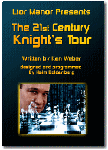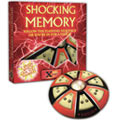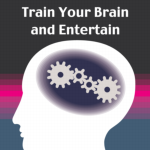 Two weeks ago, in my Mental Software Round-Up, I briefly mentioned Lior Manor's 21st Century Knight's Tour. Thanks to Lior's generosity, I am able to bring you a review of the package as a whole.
Two weeks ago, in my Mental Software Round-Up, I briefly mentioned Lior Manor's 21st Century Knight's Tour. Thanks to Lior's generosity, I am able to bring you a review of the package as a whole.
Before I proceed with the review, check out the 21st Century Knight's Tour slideshow to get a better idea of the nature of the program. I will be reviewing the Flash version only, so nothing I say should be taken to necessarily apply to the executable file.
First, I should mention that this is a legitimate version of the Knight's Tour. The program doesn't secretly signal you in any way as to where to move next. If you already do an ungimmicked version of the Knight's Tour, you should be able to adapt your versionb to use this program with few problems. It is flexible enough to perform everything from the classic Corinda version to the version in which you can have the starting and ending squares chosen.
When you begin the program itself, the program allows you to set up the parameters of the program. As you'll note from the slideshow, you can end with either a custom text background, or the built-in picture (go to the slideshow, and click on "8. Second finish with a picture".) Unfortunately, you cannot choose to use your own custom picture if you choose this option. The other major option you have when starting is whether to use the numbers 1-64 or standard algebraic chess notation (A8-H1).
Quick Shameless Plug: You can use my Train Your Brain and Entertain software (TYBE) to help both learn the method that Lior teaches in the instructions, and get used to performing the Knight's Tour without looking at the board. You'll also be able to practice both the numbered square version or the algebraic notation version with TYBE.
Once you've set the program up, it's time to hide the ending and get to the starting point from the audience's point of view. When the audience first sees the screen, they're shown only a black screen with the white text that says "start". A quick 3-d view of a chessboard plays. As you introduce the Knight's Tour challenge to the audience, the program also demos the different moves of various chess pieces, including the knight.
At this point, you'll have an assistant sit down at the keyboard, and explain that he is to click the squares as you call them out, which deletes them. If you selected the picture background, that will gradually be revealed. Otherwise, they will see scrambled letters revealed as you proceed through the challenge. At the end of the text version, the scrambled letters with rearrange themselves to reveal your choice of messages.
One minor criticism I have about the program itself is that it won't prevent illegal moves. Regardless of which square you're currently located, you can hit any other square that is still visible. As you'll often be using people from the audience to click on the board as you call out the numbers, it would have been nice if the program could prevent a square being mis-clicked. However, as long as you've learned the method properly, and can give clear instructions while maintaining good audience control, this won't prove much of an obstacle.
The accompanying instructions, in the form of a PDF file, are very clearly written. Lior describes the evolution of the program itself and how to use it very clearly. One of the best parts of the instructions is Lior's full script. His presentation covers the challenge itself, exactly how your assistant is to click on the board, and, most importantly, how to build the presentation so that it engages the audience.
As a bonus, Hal Weaver's version of the Knight's Tour from Vibrations, the journal of the Psychic entertainers Association, is reprinted in the instructions, as well. Hal Weaver's version teaches both how to memorize the algebraic notation version, as well as the psychology behind performing it that way.
There is one further bonus, which is called the “Instant Knight's Tour”. This a version of the Knight's Tour challenge in which the focus is placed on the speed, rather than the drama. Even if you don't use this version, it's a great example of how to look at other presentational approaches for a single routine.
All in all, I find Lior Manor's 21st Century Knight's Tour to be very well thought-out and executed. The lessons learned from the trials and tribulations from many regular professional performances are quite evident in the package, and make this program a great value. If the Knight's Tour suits your particular performing style, you can't go wrong with the 21st Century Knight's Tour!










